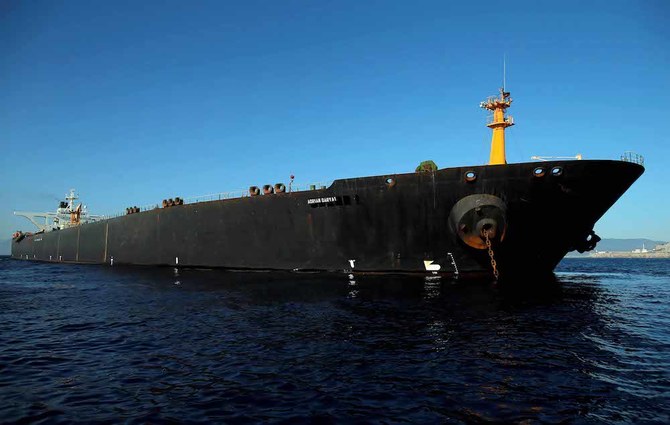LONDON: The United States on Wednesday sanctioned an “oil for terror” network of firms, ships and individuals allegedly directed by Iran’s Islamic Revolutionary Guard Corps that supplied Syria with oil worth hundreds of millions of dollars in breach of US sanctions.
The US action intensified a “maximum pressure” campaign aimed at driving to zero Iran’s oil exports, the country’s main source of income, and almost certainly will increase tensions that erupted when President Donald Trump withdrew last year from an international accord designed to stop Tehran from producing nuclear weapons.
Trump said Iran wants to negotiate and reach an agreement but Washington will not lift sanctions against Tehran
Iran has been gradually reducing its compliance with the 2015 agreement in a bid to pressure European countries to compensate it for the severe damage done to its economy by multiple rounds of US sanctions. Tehran was expected to announce further breaches sometime this month.
The 10 individuals blacklisted on Wednesday included Rostam Qasemi, a former Iranian oil minister, and his son, the US Treasury Department said in a statement.
Also hit were subsidiaries of an Indian company with an interest in the Adrian Darya, the Iranian tanker suspected of carrying oil for Syria that has been cruising the Mediterranean since its release from detention by British authorities off Gibraltar in July, it said.
The Treasury Department’s Office of Foreign Assets Control action froze any assets in the United States of the designated entities and generally prohibited US citizens or companies from doing business with them.
The department said that the Quds Force, the IRGC’s elite foreign paramilitary and espionage arm, and Hezbollah, the Iranian-backed Lebanese militia movement, profited financially by supplying Iranian oil and petroleum products, mostly to Syria, that this spring alone were worth more than $750 million.
“Treasury’s action against this sprawling petroleum network makes it explicitly clear that those purchasing Iranian oil are directly supporting Iran’s militants and terrorist arm, the IRGC-Quds Force,” Treasury Secretary Steven Mnuchin said in the statement.
Mnuchin said in announcing the designation that any companies or individuals conducting transactions with the shipping network could be exposed to punishing US financial measures.
Meanwhile, a senior US official on Wednesday ruled out issuing waivers to Iran sanctions to permit a French-proposed credit line, which Tehran says could bring it back to full compliance with the nuclear deal.
“We can’t make it any more clear that we are committed to this campaign of maximum pressure and we are not looking to grant any exceptions or waivers,” Brian Hook, the State Department coordinator on Iran, told reporters.
US Iran envoy Brian Hook announced that the Trump administration is offering “up to $15 million for information that can help disrupt the financial apparatus of Iran’s Islamic Revolutionary Guards Corps” #IRGC #USsanctionshttps://t.co/qsIilv2SOl pic.twitter.com/BteojEqjSQ
— Arab News (@arabnews) September 4, 2019
He added, however, that he has not yet seen a “concrete” French proposal and could therefore not comment on the idea.
French President Emmanuel Macron has been seeking to ease soaring tensions by bringing some economic relief to Iran and last month appeared to draw President Donald Trump’s interest when Macron said he hoped to arrange a summit between the US leader and his counterpart Hassan Rouhani.
Iran has been threatening to take new actions to curb its compliance with a 2015 denuclearization deal, from which Trump withdrew last year as he reimposed punishing sanctions.
Iran is upset that it did not reap greater dividends from compliance but said it would be satisfied if it receives $15 billion in credit, which it would pay back through future oil sales.
Hook was speaking to reporters in Washington to discuss the latest volley of US sanctions on Iran.
Hook noted that the US also imposed other sanctions on Iran on Friday and Tuesday and warned, “There will be more sanctions coming.”
Hook also announced that the Trump administration is offering “up to $15 million for information that can help disrupt the financial apparatus of Iran’s Islamic Revolutionary Guards Corps,” including on the revenue sources of the military unit, illicit oil-for-money schemes; entities or individuals that assist in evading US or international sanctions; financial institutions working with the IRGC and other measures related to its financial mechanisms.
US officials said that the Quds Force used the network to hide its involvement in the oil sales to Syrian President Bashar Assad’s government and other unidentified “illicit actors” and relied heavily on Hezbollah officials and front companies to broker the contracts.
The Quds Force and Hezbollah have been major backers of Damascus in the civil war that erupted in 2011 against decades of Assad family rule. The Quds Force and Hezbollah are on the US list of foreign terrorist organizations.
“This vast oil-for-terror shipping network demonstrates how economically reliant Tehran is on the IRGC-QF and Hezbollah as financial lifelines,” said Sigal Mandaker, the senior Treasury official who oversees sanctions.
















